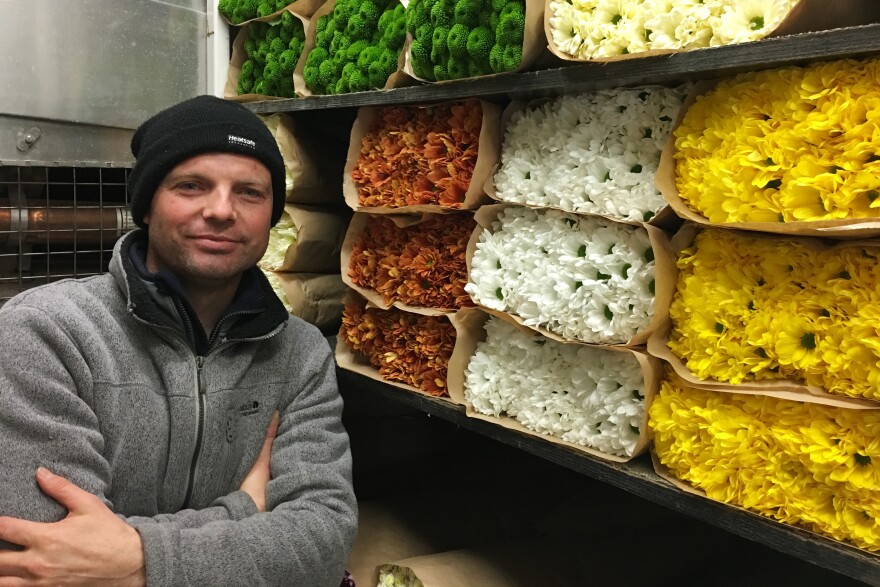Valentine's Day is usually a boon for florists. But in the United Kingdom, a cloud hangs over the industry.
Rosa Ashby, who runs Rosa Flowers in the English market town of Witney, is anxious. Every flower in her shop, including lilies, chrysanthemums and lisianthus, is either grown in or distributed through the Netherlands. That has worked just fine since Ashby started her business 22 years ago, because the U.K. has been inside the European Union's single market, and flowers — and countless other products — have flowed seamlessly across the border.
On March 29, though, that could change as the U.K. is scheduled to leave the EU and there is still no deal to keep trade moving smoothly.
"We're very worried," says Ashby, sitting at a table in her shop in Oxfordshire, which she leaves mostly unheated during the winter to preserve her flowers. "We don't know what's going to happen on the 29th. The government doesn't know. Nobody knows. And our worry is: When will we get the flowers? What price will they be if tariffs go on?"
NPR sent Ashby's quotes to the U.K.'s Department for Environment, Food and Rural Affairs seeking a response. A government spokesman said the majority of flowers from the EU will continue to enter the U.K. without health checks but mentioned nothing about tariffs.
If the U.K. leaves the EU without terms for a transition period to a new trade agreement with the bloc — a no-deal Brexit — then trade is expected to continue under rules outlined by the World Trade Organization.
The British Florist Association estimates that flowers coming from the EU could face tariffs ranging from 4 to 12 percent.
The growing risk of leaving the EU without a deal has raised fears of shortages in the U.K. Some businesses have packed warehouses across the country with everything from auto parts to ice cream in case trade slows dramatically. But Ashby and her industry don't have that luxury and she says she doesn't have a contingency plan.
"We can't stockpile our goods because they're fresh flowers," she says.

Ashby's plight is typical of many florists here and highlights how flower-growing has changed in Britain over the decades. Brian Wills-Pope, chairman of the British Florist Association, says when he started in the business in the 1970s, half the flowers sold in the U.K. came from Holland. Today, he says, the figure is 80 percent. That dependency, which developed over the decades as U.K. nurseries closed down and more production shifted to the Netherlands, now poses a potential threat to florists here.
"We are looking at something which is unprecedented in the 40 years that we've been part of that single market," said Wills-Pope, referring to the U.K.'s economic integration with Europe.
British flower sellers aren't the only ones worried about a "no deal" Brexit; so are their suppliers in the Netherlands. Barry Snapper has been selling flowers to Ashby for at least six years. Each week, he brings his flowers through the Channel Tunnel in a refrigerated tractor-trailer and parks down the walk from Ashby's shop. Snapper and Ashby haggle in the back of the truck surrounded by flowers as he presses her to buy more and more.
"Snapdragons?" he offered during a visit last week.
"No, no," said Ashby, fending off his repeated attempts.
Snapper is concerned that a no-deal Brexit will trigger import duties and delays at the Channel Tunnel that will force suppliers like him to raise prices. He worries that shops here in the U.K. will have a hard time passing those costs on to customers.
"A lot of people will struggle to sell flowers to the public," said Snapper. "People will still buy food and everything, but what they can skip are the flowers."
Snapper is as dependent on sales to the U.K. market as Ashby is on supply from the Netherlands. He says after selling to the U.K. for two decades, it's too difficult to shift to another country now. Some of Snapper's clients say Valentine's Day orders have been down, which they attribute to uncertainty and anxiety around Brexit. Snapper, who is garrulous and a natural salesman, has tried to calm their fears, suggesting it's just men typically waiting until the last minute to buy flowers for their sweethearts or wives.
To the degree that they can, British flower shops are planning ahead. They are ordering early for Mother's Day, which in the U.K. falls on March 31 — just two days after the U.K. is scheduled to leave the EU.
Copyright 2021 NPR. To see more, visit https://www.npr.org.





